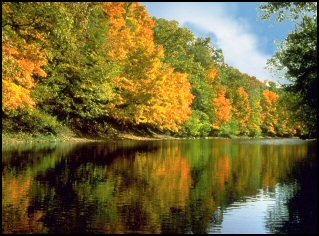
Countdown to Earth Day
April 14, 2004

Photo credit: The Nature Conservancy
“And with water we have made all living things”
- The Koran, Sura XXI (Al Anbiya):30
We’ve all heard stories about large industries or accidents causing contamination of rivers and groundwater. They make the front pages and result in large legal and regulatory actions. But what about the small scale - the activities of individuals like you and me? Multiply our individual actions by a neighborhood, or a city and you can quickly get to some pretty serious consequences.
There is a reason why many cities place warning markers on storm drains - anything going down the drain usually heads untreated into the nearest river. Here are a few tips to help protect your watershed:
When washing your car–
• use a bucket instead of a hose; this reduces run-off and saves on your water bill;
• use biodegradable soaps;
• park your car on the lawn or over gravel so that the wash and rinse water don’t flow into the storm drains
When maintaining your car –
• clean up any spills of oil, gas, antifreeze quickly; don’t let them get washed into the street;
• don’t put any automotive products into the storm sewers - remember, one gallon of used oil can ruin one million gallons of fresh water (a year’s supply for 50 people);
• dispose of used oil correctly - many oil change and auto parts dealers will take used oil at no charge (it can be recycled);
• store materials safely - anti-freeze has a very sweet taste that is attractive to children and pets, but it is highly toxic.
When caring for your garden and lawn –
• be very circumspect about how much chemical treatment you apply to your grass - plant native grasses that don’t require high levels of fertilizer;
• avoid using lawn care services that tend to over fertilize and over treat lawns - all that excess goes right down the drain;
• do not treat your lawn when heavy rains are predicted;
• when going after weeds, dig them by hand or apply weed killer very judiciously - never spray the whole area;
• remember, weed killer and pesticides carried into streams continue to perform their function in the wrong place - and a high fertilizer load can cause the same hypoxic conditions in your own river that occur in the Gulf of Mexico Dead Zone.
Get additional ideas at U.S. EPA’s page for Do’s and Don’t’s Around the Home at:
http://www.epa.gov/owow/nps/dosdont.html